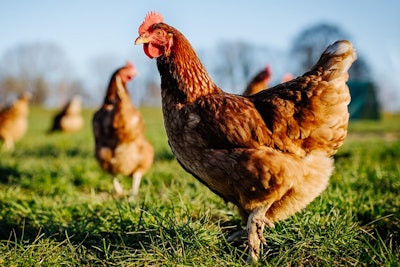
A bacteriophage treatment that effectively reduces colonization of chickens with avian pathogenic Escherichia coli (APEC) has been developed by Purdue University’s College of Agriculture.
According to the college, use of the treatment, along with good flock management, can significantly reduce the need for antibiotics in maintaining bird health.
The Purdue team isolated seven bacteriophages that showed activity against the most prevalent APEC variants.
Cocktail
Paul Ebner, who led the research team, explained: “Taken together, they lysed 90% of the APEC strains we tested. When given to chickens, the treatment results in significant reduction of APEC in the treated chickens’ lungs and ceca. Additionally, the treatments do not negatively impact growth or performance, and the birds do not develop an immune response to the phages.”
The product is delivered orally, with microencapsulation protecting the phages from the gastrointestinal tract environment facilitating more viable bacteriophages reaching sites of infection.
The treatment is the result of a project, conducted at the Indiana, U.S.-based college, to create technologies that could reduce use of antibiotics used in food animal production in low- and middle-income countries, and a prototype was developed for in use Pakistan, amongst other countries.
A willingness to pay study has been conducted in Pakistan, with results showing that consumers would pay a premium for chicken produced with bacteriophages instead of antibiotics. The university is now working to identify barriers to adoption among poultry producers and animal health professionals.
Developing sector
A small number of phage products for use in the poultry industry are already marketed, but there remain numerous barriers to their use in the livestock sector, despite being widely seen as a potential alternative to antibiotics. Amongst hurdles are antibiotics’ historical success, availability and familiarly, but difficulties in registration in a number of countries has also made bringing them to market difficult.
Progress is, however, being made in making their use easier. Earlier this year, for example, an organization to share knowledge, experience and facilitate regulatory approval, Phage Asia, was established. Its founders point out that lack of awareness within the food value chains, along with regulatory delays, are holding back wider adoption of the technology.













